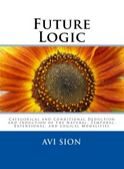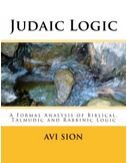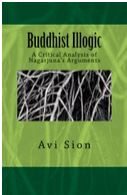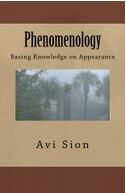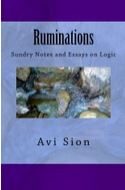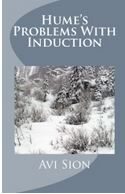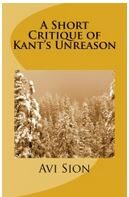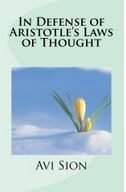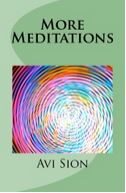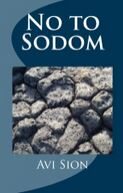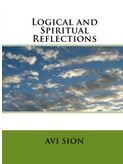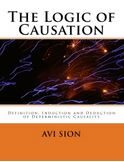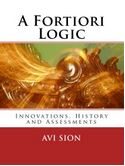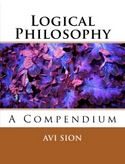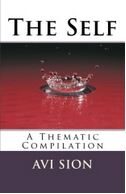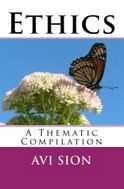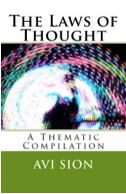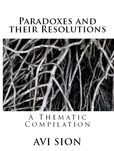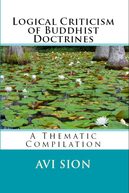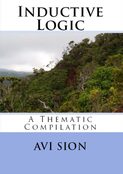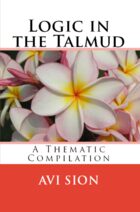Avi Sion's books online
Avi Sion has, to date, published the 29 books on logic, philosophy and spirituality which are listed below.
These books can all be read online in his websites (just follow the links: TL refers to TheLogician.net, ASB to AviSionBooks.com, and TC to websites dedicated to an individual 'thematic compilation').
They can also be read in more public locations, such as the Internet Archive and Google Books, and at many public and university libraries.
They can also be purchased online, in print and e-book editions, at Amazon.com, Lulu.com, and other sales channels.
|
|
Future Logic is an original and wide-ranging treatise of formal logic. It deals with deduction and induction, of categorical and conditional propositions, involving the natural, temporal, extensional, and logical modalities. This is the first work ever to strictly formalize the inductive processes of generalization and particularization, through the novel methods of factorial analysis, factor selection and formula revision. This is the first work ever to develop a formal logic of the natural, temporal and extensional types of conditioning (as distinct from logical conditioning), including their production from modal categorical premises. |
|||
|
|
Judaic logic engages in a formal analysis of Biblical, Talmudic and Rabbinic logic. It is an original inquiry into the forms of thought determining Jewish law and belief, from the impartial perspective of a logician. Judaic Logic attempts to honestly estimate the extent to which the logic employed within Judaism fits into the general norms, and whether it has any contributions to make to them. |
|||
|
|
Buddhist Illogic engages in a critical analysis of Nagarjuna's arguments. The 2nd Century CE Indian philosopher Nagarjuna founded the Madhyamika (Middle Way) school of Mahayana Buddhism, which strongly influenced Chinese, Korean and Japanese Buddhism, as well as Tibetan Buddhism. His writings include a series of arguments purporting to show the illogic of logic, the absurdity of reason. He considers this the way to verbalize and justify the Buddhist doctrine of “emptiness” (Shunyata). The present essay demonstrates the many sophistries involved in Nagarjuna’s arguments. |
|||
|
|
Phenomenology is the study of appearance as such. It is a branch of both Ontology and Epistemology, since appearing is being known. By an ‘appearance’ is meant any existent which impinges on consciousness, anything cognized, irrespective of any judgment as to whether it be ‘real’ or ‘illusory.’ The evaluation of a particular appearance as a reality or an illusion is a complex process, involving inductive and deductive logical principles and activities. Opinion has to earn the status of strict knowledge. |
|||
|
|
Volition and Allied Causal Concepts is a work of aetiology and metapsychology. Aetiology is the branch of philosophy and logic devoted to the study of causality (the cause-effect relation) in all its forms; and metapsychology is the study of the basic concepts common to all psychological discourse, most of which are causal. This is a work of ambitious scope, intent on finally resolving philosophical and logical issues that have always impeded progress in psychology. |
|||
|
|
Ruminations is a collection of sundry notes and essays on Logic. These complement and enrich the author’s past writings, further analyzing or reviewing certain issues. Some important new insights are included here, such as the inductive understanding of negation. |
|||
|
|
Meditations. A meditation is a voluntary exercise intended to increase awareness, sustained over some time. The main purpose of this book is to inspire and assist readers to practice meditation of some sort, and in particular ‘sitting meditation’. |
|||
|
|
Hume’s Problems with Induction is intended to describe and refute some of the main doubts and objections David Hume raised with regard to inductive reasoning. It replaces the so-called problem of induction with a principle of induction. |
|||
|
|
A Short Critique of Kant’s Unreason is a brief critical analysis of some of the salient epistemological and ontological ideas and theses in Immanuel Kant’s famous Critique of Pure Reason. It shows that Kant was in no position to criticize reason, because he neither sufficiently understood its workings nor had the logical tools needed for the task. |
|||
|
|
In Defense of Aristotle’s Laws of Thought addresses, from a phenomenological standpoint, numerous modern and Buddhist objections and misconceptions regarding the basic principles of Aristotelian logic. |
|||
|
|
More Meditations is a sequel to the author’s earlier work, Meditations. It proposes additional practical methods and theoretical insights relating to meditation and Buddhism. It also discusses certain often glossed over issues relating to Buddhism – notably, historicity, idolatry, messianism, importation to the West. |
|||
|
|
Zen Judaism is a frank reflection on the tensions between reason and faith in today’s context of knowledge, and on the need to inject Zen-like meditation into Judaism. This work also treats some issues in ethics and theodicy. |
|||
|
|
No to Sodom is an essay against homosexuality, using biological, psychological, spiritual, ethical and political arguments. |
|||
|
|
Logical and Spiritual Reflections is a collection of six shorter philosophical works, including: Hume’s Problems with Induction; A Short Critique of Kant’s Unreason; In Defense of Aristotle’s Laws of Thought; More Meditations; Zen Judaism; No to Sodom. |
|||
|
|
The Logic of Causation is a treatise of formal logic and of aetiology. It is an original and wide-ranging investigation of the definition of causation (deterministic causality) in all its forms, and of the deduction and induction of such forms. The work was carried out in three phases over a dozen years (1998-2010), each phase introducing more sophisticated methods than the previous to solve outstanding problems. |
|||
|
|
A Fortiori Logic is a wide-ranging and in-depth study of a fortiori reasoning, comprising a great many new theoretical insights into such argument, a history of its use and discussion from antiquity to the present day, and critical analyses of the main attempts at its elucidation. Its purpose is nothing less than to lay the foundations for a new branch of logic, and greatly develop it; and thus to once and for all dispel the many fallacious ideas circulating regarding the nature of a fortiori reasoning. |
|||
|
|
Logical Philosophy is a compendium of five works by Avi Sion published in 2002-06, namely: Phenomenology (2003), Volition and Allied Causal Concepts (2004), Meditations (2006), Ruminations (2005), and Buddhist Illogic (2002). These works together define what may be termed ‘Logical Philosophy’, i.e. philosophical discourse distinguished by its steadfast reliance on inductive and deductive logic to resolve epistemological and ontological issues. |
|||
|
|
The Self is an inquiry into the concepts of self, soul, person, ego, consciousness, psyche and mind – ranging over phenomenology, logic, epistemology, ontology, psychology, spirituality, meditation, ethics and metaphysics. This book is a thematic compilation drawn from past works by the author over a period of eighteen years. Read online at: TC |
|||
|
|
Ethics is a collection of thoughts on the method, form and content of Ethics. This book is a thematic compilation drawn from past works by the author, over a period of thirteen years. Read online at: TC |
|||
|
|
Theology is about God and Creation, or more precisely perhaps about our ideas of them, how they are formed and somewhat justified, although it is stressed that they can be neither proved nor disproved. This book is a thematic compilation drawn from past works by the author over a period of thirteen years. Read online at: TC |
|||
|
|
The Laws of Thought is an exploration of the deductive and inductive foundations of rational thought. The author here clarifies and defends Aristotle’s Three Laws of Thought, called the Laws of Identity, Non-contradiction and Exclusion of the Middle – and introduces two more, which are implicit in and crucial to them: the Fourth Law of Thought, called the Principle of Induction, and the Fifth Law of Thought, called the Principle of Deduction. This book is a thematic compilation drawn from past works by the author over a period of eighteen years. Read online at: TC |
|||
|
|
Paradoxes and Their Resolutions: This 'thematic compilation' comprises expositions and resolutions of many (though not all) ancient and modern paradoxes, including: the Protagoras-Euathlus paradox, the Liar paradox and the Sorites paradox, Russell’s paradox and its derivatives the Barber paradox and the Master Catalogue paradox, Grelling’s paradox, Hempel's paradox of confirmation, and Goodman’s paradox of prediction. This volume also presents and comments on some of the antinomic discourse found in some Buddhist texts (namely, in Nagarjuna and in the Diamond Sutra). Read online at: TC |
|||
|
|
Logical Criticism of Buddhist Doctrines: This 'thematic compilation' comprises expositions and empirical and logical critiques of many (though not all) Buddhist doctrines, such as impermanence, interdependence, emptiness, the denial of self or soul. It includes the author's most recent essay, regarding the five skandhas doctrine. Read online at: TC |
|||
|
|
Inductive Logic is a ‘thematic compilation’ by Avi Sion. It collects in one volume many (though not all) of the essays, that he has written on this subject over a period of some 23 years, which all demonstrate the possibility and conditions of validity of human knowledge, the utility and reliability of human cognitive means when properly used, contrary to the skeptical assumptions that are nowadays fashionable. Read online at: TC |
|||
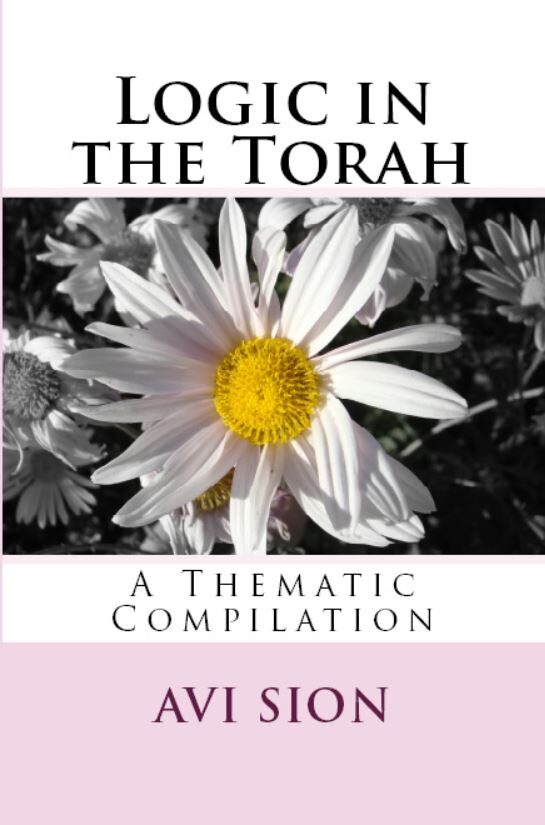 |
Logic in the Torah is a ‘thematic compilation’ by Avi Sion. It collects in one volume essays that he has written on this subject in Judaic Logic (1995) and A Fortiori Logic (2013), in which traces of logic in the Torah and related religious documents (the Nakh, the Christian Bible, and the Koran and Hadiths) are identified and analyzed. Read online at: TC |
|||
|
|
Logic in the Talmud is a ‘thematic compilation’ by Avi Sion. It collects in one volume essays that he has written on this subject in Judaic Logic (1995) and A Fortiori Logic (2013), in which traces of logic in the Talmud (the Mishna and Gemara) are identified and analyzed. While this book does not constitute an exhaustive study of logic in the Talmud, it is a ground-breaking and extensive study. Read online at: TC
|
|||
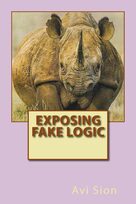 |
Exposing Fake Logic by Avi Sion is a collection of essays written after publication of his book A Fortiori Logic, in which he critically responds to derivative work by other authors who claim to know better. This is more than just polemics; but allows further clarifications of a fortiori logic and of general logic. Read online at: TC
|
|||
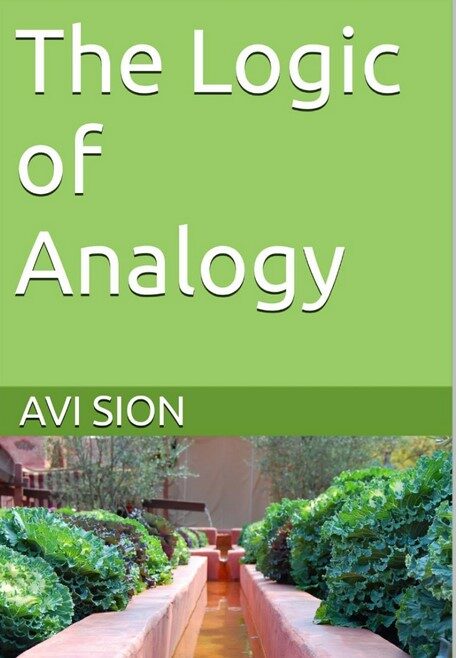 |
The Logic of Analogy is a study of the valid logical forms of qualitative and quantitative analogical argument, and the rules pertaining to them. It investigates equally valid conflicting arguments, statistics-based arguments and their utility in science, arguments from precedent used in law-making or law-application, and examines subsumption in analogical terms. Included for purposes of illustration is a large section on Talmudic use of analogical reasoning. |
|||
 |
All The More comprises a merged list of 72 qal vachomer arguments in the Tanakh, i.e. of a fortiori arguments in the Hebrew Bible. This listing brings together lists proposed in past rabbinic literature and in more recent studies by the author. The literature research for it was carried out mainly by R. Yaakov Gabay, who looked into works in Hebrew by five rabbis who had proposed lists. The author of the present essay brought additional information from other sources. |
|||
Please note well: All texts mentioned here are copyrighted (1990-2024), under International and Pan-American conventions. All rights are reserved by the author and publisher, Avi Sion. No text may be reproduced or republished, in any manner whatsoever, without written permission of the author-publisher. Brief quotations are permitted provided they include due acknowledgement of the author-publisher.

